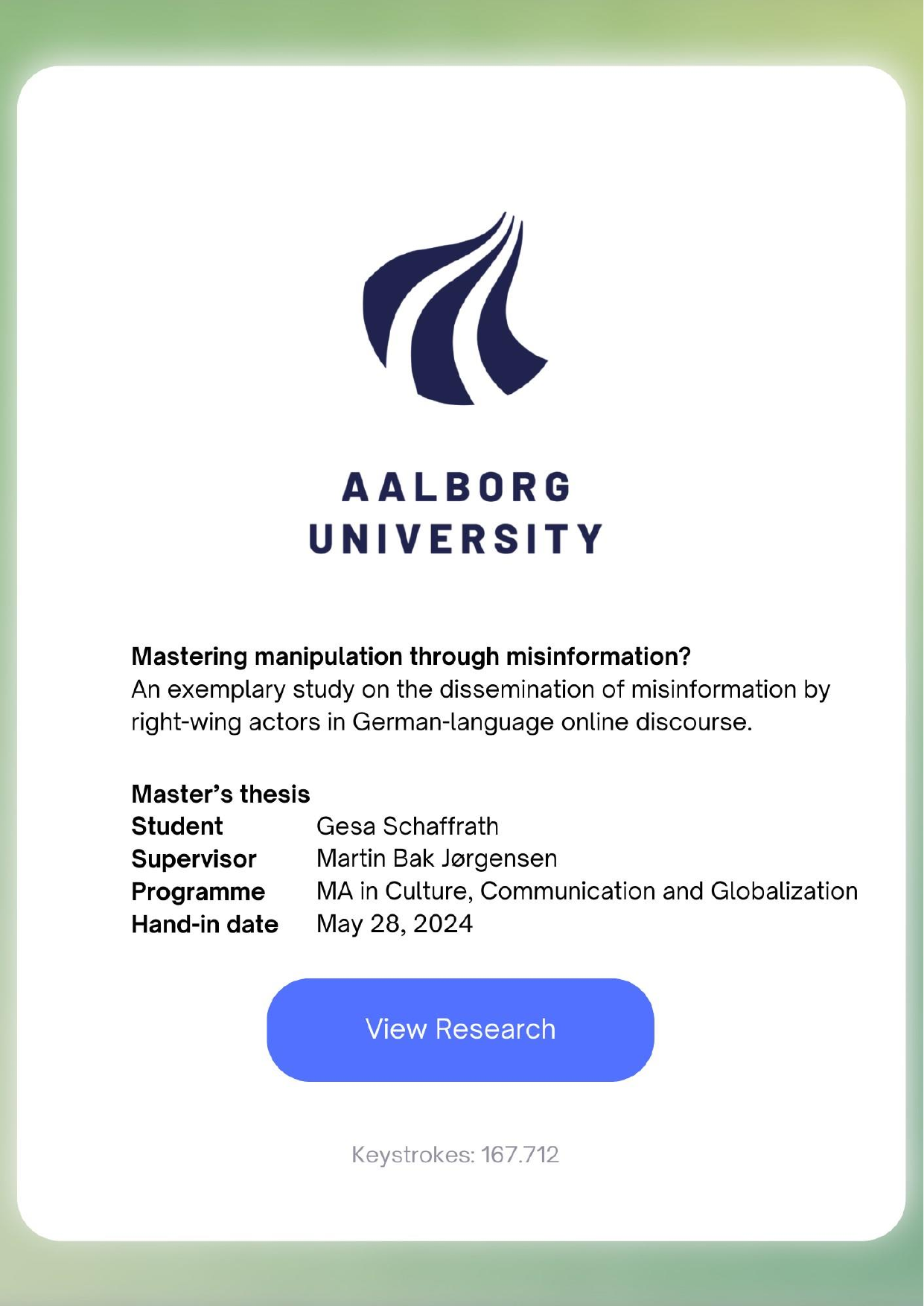
Mastering manipulation through misinformation?: An exemplary study on the dissemination of misinformation by right-wing actors in German-language online discourse.
Translated title
Mastering manipulation through misinformation?
Author
Term
4. term
Publication year
2024
Submitted on
2024-05-28
Abstract
With their unrivalled reach and fast publishing pace, online posting platforms allow the diffusion of information to a global audience in real-time. Not only does this make the dissemination of misinformation easy but it also complicates the counteraction to this (Caled & Silva, 2022). The aim of this qualitative research is to add to the research on the use of misinformation on online platforms and their aim to manipulate political discourse. For this, the research question “How can misinformation tactics be used in an online space to strategically manipulate political discourse?” stood in the centre of this research. With a focus on right-wing populist publishers, an understanding for the strategy behind discourse manipulation through populist narratives and the role of the dissemination of misinformation in this context is developed. The analysis uses data collected from channels on Telegram, YouTube and TikTok. From each platform, two channels were chosen according to their reach and political relevance, featuring channels by partisan and non-partisan actors. As timely limitation, the discourse surrounding the protests throughout Germany, demanding the ban of the AfD was chosen. The timeframe has been narrowed down to January 10th until 31st. The protests arose after the publication of a report from Correctiv which addressed a meeting of AfD politicians and supporters of the political right (Schwarz, 2024). The theoretical framework includes the elaboration of populism with a focus on right-wing populism in Germany. Populism and Discourse Manipulation Theory according to van Dijk (2006a) serves as conceptual basis. With a focus on the dissemination of misleading information within right-wing media or communication channels, this analysis builds on a broad line of research on the importance of misleading information for right-wing communicators, as well as research on the tactical usage of this. Looking at populism as an ideology enables an understanding of the motivations of the manipulators and the belief systems of their recipients possible. The socio-cognitive approach by van Dijk (2006a) additionally is a possible explanation for the function of misinformation tactics in discourse manipulation strategy. To adequately implement these theoretical approaches to the analysis, an abductive approach is used. The perception of truth through the recipients is considered in the analysis, as it relies “on explanation and understanding on participants’ worldview” (Bryman, 2012, p. 401). The chosen scientific philosophical approaches to this, are Interpretivism and Social Constructionism. Understanding truth as socially constructed and inseparably linked to subjective knowledge, the research builds on the assumption that discourse is constantly produced and re-produced and thus, dynamically changing, which makes it manipulable (Gyollai, 2022). Therefore, the focus is on the construction of discourse through manipulation by using misinformation tactics. Based on this, the results of the analysis showed the link between the analysed channels via their common belief systems. This confirmed that one can speak of a right-wing information ecosystem in this case and the shared populist ideology in the investigated channels. The manipulative function of misinformation in the analysed discourse was illustrated through the connected analysis of both aspects in the observed discourse. The question was answered, showing that the misinformation tactics were mostly used to create emotions, polarization, and discredit other political views. The analysis shows that misinformation tactics are recognizable but cannot with certainty be framed as a misinformation campaign. Besides that, the research gives an insight into the intention behind misinformation to possibly change the mediated discourse, i.e., the resulting action such as electoral behaviour, aggression towards a certain group of people and targets of political action. A further investigation in this, could enable researchers to make stronger statements regarding the campaign-character of populist discourse manipulation. Critical discourse analysis or the focus on visual tools to enhance this, could be subject of further research. Understanding how right-wing populists use misinformation tactics to manipulate discourse, is a first step to encounter their strategies. As other research has shown, the discourse manipulation on online platforms is a far-spread issue. This research therefore serves as an addition to these, regarding a specific time-period which is of recent interest due to the participation of the AfD in the election for the European Parliament.
Keywords
Documents
